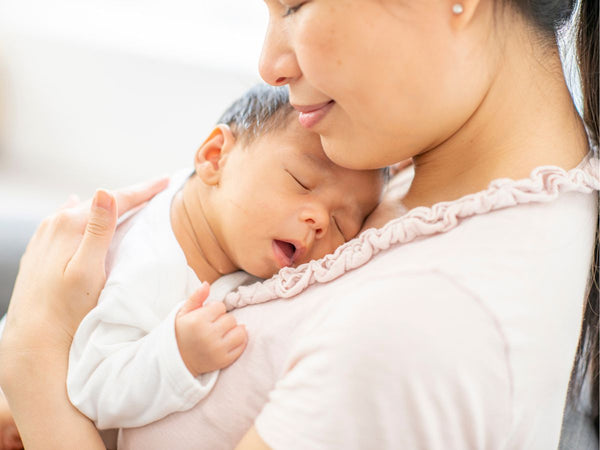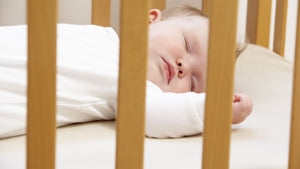Key Points
- The first 12 months are crucial for a baby's development, shaping habits with lasting effects on relationships.
- Attachment parenting involves responding to a baby's needs promptly, fostering a strong early bond.
- Tips for parents with one away: Maintain routines, be confident in feeding decisions, make independent choices, and provide consistent rules.
- Create emergency plans to reduce stress during unforeseen situations.
There is nothing more rewarding than giving birth to a newborn baby and being able to take them home after nine months of cravings, hormones and pains. But parenting doesn’t get any easier after childbirth. A recent online survey revealed that the most common struggles for parents in the first year include lack of sleep, baby’s ability to sleep, feeding, recovery from birth and taking care of their other children.
Balancing these things becomes all the more challenging when you consider that your baby’s first 12 months is the most important part of their life. The habits your baby is exposed to during that first year can have long-lasting effects on their life and their ability to form meaningful, healthy relationships with others. Our Baby Sleep Guide will help you understand your baby as well as sleeping and settling.

Attachment theory and your baby’s early life
One of the most important ways we think about modern parenting is through the lens of attachment theory. Attachment is not always easy to describe in a few short sentences, but it was perhaps described most eloquently by Mary Ainsworth as:
“...the deep and enduring emotional bond that connects one person to another across time and space.”
The ‘father of Attachment Theory,’ John Bowlby proposed that babies have an innate drive to be bonded to another for safety, security and survival. This theory proposes that the way parents respond to a baby's efforts to connect will influence how each baby learns about relationships.
Attachment theory is much broader and deeper than this description. However, Bowlby’s 1950’s work has been strongly supported over the past 20 years through extensive Relational and Neuroscientific research.
There are specific features identified in Attachment Theory that relate to the quality of each baby’s experiences. A baby needs to:
- Be close to someone who will provide care (proximity seeking)
- Experience feeling safe (safe haven)
- Experience feeling security (secure base)
When a baby experiences a world that provides these basics, they know there will be a special person who can provide comfort when needed. This is also crucial to teaching babies to tolerate separation from their caregiver without debilitating anxiety.
When all these needs are met in a predictable and consistent way, the baby is most likely to develop what is classified as ‘secure attachment’. If however a parent cannot provide this type of care, it is likely the baby will need to develop internal mechanisms to protect themselves. This is where the initial defence mechanisms begin to develop, leading to characteristics that are classified as ‘insecure attachment’.
If a baby experiences chaotic, frightening and erratic care, it is likely that the baby will then develop what is classified as ‘disorganised attachment’. It is difficult to think that a baby has to fend for themselves in this world, but it often leads to difficulties relating to others and forming trusting relationships.
What is attachment parenting?
Teaching kids to become self-sufficient is a major part of parenting. But, when your baby is very young, they’re going to need all the help they can get. Forget any notion you have of teaching self-sufficiency at a young age.
While some parenting styles call for tactics like allowing the baby to “cry it out,” the science has shown that excessive crying can be harmful to your baby’s development. Attachment parenting is the opposite of these tactics. Under attachment parenting, parents give as much care and attention as their baby calls for. That includes responding to cries at all hours, feeding at inconvenient times, spending time with your baby when you have other responsibilities and much more.
As difficult and frustrating as attachment parenting can be, it’s one of the most effective ways of forming this early bond. As Dr. Sears reminds us all, babies cry to communicate with us, not to manipulate. The 3am morning cries are something that we just have to cope with.

Attachment parenting when one parent is away
Parenting can be challenging, even when both parents are at home. But, if one parent has to leave the house regularly or for extended periods, attachment parenting can’t simply come to a stop. If your partner regularly spends time away from home (like FIFO work), these tips can help to maintain consistency in your parenting:
- Follow the settling/sleep patterns that work best for your children. Expect some changes in their usual responses when their other parent returns home. Importantly, stay calm and reassuring in your responses.
- Be confident in your own ability to make choices about your baby’s feeding. Breast milk supply can be reduced during periods of stress and tension. Remember, supply equals demand so if your baby seems hungry, offer them more frequent breastfeeds. Speak with your baby’s child health nurse if you’re concerned about any growth or development issues.
- Accept that there is reduced opportunity for communication with the other parent. You might not always be able to make mutual decisions.
- Develop skills in being the decision maker in the family. Even if this is challenging initially, there will be times when you need to ‘take charge’ and make independent, wise decisions for the good of everyone.
- Try to keep daily routines as consistent as possible. Kids thrive on predictability and structure. Don’t change what works, and save your energy for making changes that are unavoidable.
- Avoid threatening your children with what will happen when their other parent returns home. It’s important for children to have consistent rules and boundaries communicated by both parents.
- Be mindful of how your children are adjusting to having their other parent away. Young children can be particularly sensitive to being separated from a parent for regular or extended periods.

Attachment parenting when both parents return home
Make time to reconnect as a couple. Evidence has shown that departure and return home times are periods of peak stress. Adult depression and anxiety are also more common in the lead up to separation and reunification.
Prioritise jobs which have to get done when you’re both home. But remember that it’s important to have fun as well. Accept that it will be enough on some days just to do the basics – anything else will be a bonus.
5 tips for effective parenting during periods of separation
While attachment parenting is typically designed to give your baby the best start in life, maintaining those close, supporting relationships is important at every stage of life. If you and your partner experience repeated periods of separation, these 5 tips can make it easier to parent your children and give them supportive childhood:
- Maintain open communication. Make time to connect with each other when apart, using as much technology as possible. Video calls, texts and family group messages are great ways to stay connected with each other. Make special efforts for birthdays and your children’s milestones. This can be especially important in the first 12 months when children progress quickly through many developmental milestones.
- Don’t save hard conversations for when you’re together. It’s important your partner is still involved in the big decisions of family life. Set aside time during your regular phone calls to discuss practical and household matters so that you’re both sharing the responsibility.
- Give each other time to settle back into family life. Parents who travel regularly often experience feelings of transience, as if they don’t really belong in any one place. This can be worse for those who work in isolated communities or who only have contact with a few other people. Similarly, it could take you time to adjust to having another adult in the house.
- Make a plan for emergencies. Even something as simple as being unsure of how your partner will get home can cause stress. Create a plan of what you both need to do if an emergency occurs so that you both feel more in control of the situation.
- Share traditional gender roles. Sharing roles and learning parenting and household skills which can’t be deferred until the absent partner is home is important to creating a supportive environment for your baby. Make sure you have supportive people around you who can help resolve problems when your partner is away. This can include grandparents raising grandchildren.
Our Products
-

01. Guide to a Healthy Pregnancy
$55 -

02. Positive Birthing Course
$55 -

03. Baby Feeding Guide
$55 -

04. Baby Sleep Guide - First 12 Months
$55 -

05. Positive Parenting Course 1 - 3 Years
$55
-
 Is it normal for babies to be noisy?
Is it normal for babies to be noisy?
 Recently we asked Natalie van Winckel, Senior Early Parenting Sleep Consultant and Education Lead from Nourish Baby and Safe Sleep Space, to share her insights into what separates noisy babies from others who are less vocal.
Recently we asked Natalie van Winckel, Senior Early Parenting Sleep Consultant and Education Lead from Nourish Baby and Safe Sleep Space, to share her insights into what separates noisy babies from others who are less vocal. -
 Contraception after birth
Contraception after birth
Most women are fertile two weeks before their period starts. However, breastfeeding can delay the return of periods, making it hard for women to know with any confidence when their ‘fertile window’ may be. This is why some women conceive again before their periods have come back.






 Is it normal for babies to be noisy?
Is it normal for babies to be noisy?
 Contraception after birth
Contraception after birth








